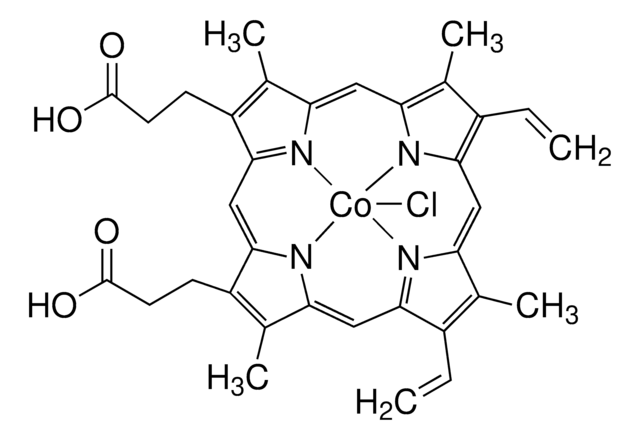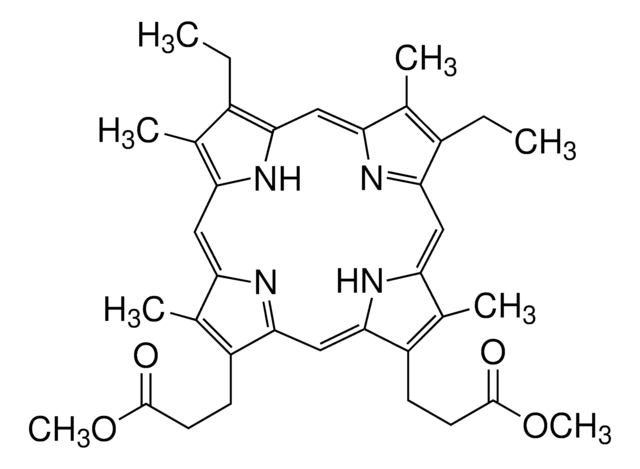P8293
Protoporphyrin-IX
≥95%
Synonym(e):
3,7,12,17-Tetramethyl-8,13-divinyl-2,18-porphindipropionsäure, Kammerers Porphyrin, Ooporphyrin
About This Item
Empfohlene Produkte
Assay
≥95%
Form
powder
Fluoreszenz
λex 402 nm; λem 625 nm (bound to HRP)
λex 409 nm; λem 633 nm
Lagertemp.
2-8°C
SMILES String
Cc1c(CCC(O)=O)c2cc3[nH]c(cc4nc(cc5[nH]c(cc1n2)c(C)c5C=C)c(C)c4C=C)c(C)c3CCC(O)=O
InChI
1S/C34H34N4O4/c1-7-21-17(3)25-13-26-19(5)23(9-11-33(39)40)31(37-26)16-32-24(10-12-34(41)42)20(6)28(38-32)15-30-22(8-2)18(4)27(36-30)14-29(21)35-25/h7-8,13-16,35,38H,1-2,9-12H2,3-6H3,(H,39,40)(H,41,42)/b25-13-,26-13-,27-14-,28-15-,29-14-,30-15-,31-16-,32-16-
InChIKey
KSFOVUSSGSKXFI-UJJXFSCMSA-N
Suchen Sie nach ähnlichen Produkten? Aufrufen Leitfaden zum Produktvergleich
Allgemeine Beschreibung
Anwendung
- als Standard in Protoporphyrin-Assays
- in der Fluoreszenzspektroskopie
- zur Behandlung von Zellen in Zellkulturen zur Erforschung der Häm-vermittelten Ferroportin-1-Transkription
Biochem./physiol. Wirkung
Ähnliches Produkt
Signalwort
Warning
H-Sätze
Gefahreneinstufungen
Eye Irrit. 2 - Skin Irrit. 2 - STOT SE 3
Zielorgane
Respiratory system
Lagerklassenschlüssel
11 - Combustible Solids
WGK
WGK 3
Flammpunkt (°F)
Not applicable
Flammpunkt (°C)
Not applicable
Persönliche Schutzausrüstung
dust mask type N95 (US), Eyeshields, Gloves
Analysenzertifikate (COA)
Suchen Sie nach Analysenzertifikate (COA), indem Sie die Lot-/Chargennummer des Produkts eingeben. Lot- und Chargennummern sind auf dem Produktetikett hinter den Wörtern ‘Lot’ oder ‘Batch’ (Lot oder Charge) zu finden.
Besitzen Sie dieses Produkt bereits?
In der Dokumentenbibliothek finden Sie die Dokumentation zu den Produkten, die Sie kürzlich erworben haben.
Kunden haben sich ebenfalls angesehen
Vesicle Formation
Unser Team von Wissenschaftlern verfügt über Erfahrung in allen Forschungsbereichen einschließlich Life Science, Materialwissenschaften, chemischer Synthese, Chromatographie, Analytik und vielen mehr..
Setzen Sie sich mit dem technischen Dienst in Verbindung.











